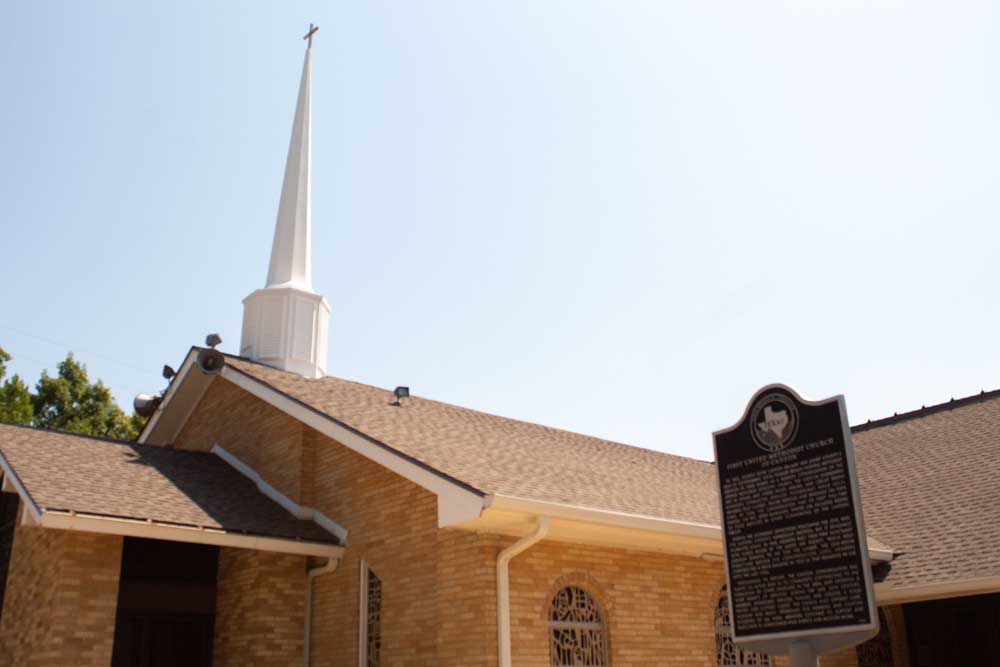Differing opinions lead to divide of United Methodist Church; local pastors say core vision remains unchanged
Published 5:45 am Sunday, July 3, 2022

- The United Methodist Church denomination has been facing conflict in opinions leading to talk of splitting. Church congregations have begun having conversations about disaffiliation. Pictured is the Canton First United Methodist Church.
Ongoing conflicting views have left United Methodist Church congregations with a choice to make: Do they want to see their church disaffiliate, or remain part of the UMC organization?
For decades the United Methodist Church has faced some areas where the denomination is divided on its opinion, including the topic of human sexuality.
Trending
“As in so many aspects of our society, there seem to be hot-button items and issues that become more predominant in driving the conversation, and sometimes creating dissonance that breaks into some of that unity within Christianity in general, within society even more generally – the United Methodist Church is not immune to that,” said Longview First United Methodist Church Senior Pastor Jay Jackson.
Issues within the UMC are characterized differently by different people, Jackson said. To him, the Methodist church has always been bound by “one heart,” and with people of “different minds.”
Over the last several decades conversations in the UMC have increased around the topic of human sexuality, with some individuals having different preferences in the way local churches should be operated under the denominational structure, Jackson said.
Adam Muckleroy, pastor at Canton First United Methodist Church, said the Methodist church has been discussing whether the church should bless same-sex weddings and ordain individuals who are part of the LGBTQ+ community.
“That conversation has been going on for awhile and really within the last couple of years now we’ve been working to move beyond that impasse and find creative ways to help each individual church be in the spot where it can best … offer Christ in their context and in connection to what they believe,” Muckleroy said.
Sexuality was first debated at the UMC General Conference in 1972, only four years after the church’s formation, according to the UMC website. This discussion resulted in the first “statement on homosexuality.”
Trending
Within the denomination’s statement on human sexuality, the UMC believes that sexuality is God’s gift to all persons. All people are entitled to their human and civil rights regardless of sexual orientation, gender identity, age or marital status.
While the UMC’s statement says the denomination does not “condone the practice of homosexuality and considers this practice incompatible with Christian teaching, the church also believes all people are of “sacred worth” and need the ministry and guidance of the church. People should not be condemned based on their sexuality, according to the statement.
With this stance on human sexuality there have been restrictions placed on those in the LGBTQ+ community saying pastors cannot be “self-avowed, practicing homosexuals,” and ceremonies celebrating same-sex weddings are not permitted.
Conflicting feelings over the UMC’s statements regarding human sexuality and the restrictions that come with it have been expressed at every general conference since 1972. During the next conference in 2024, both legislative proposals to alter existing policies in both a more exclusive and inclusive direction and to divide or restructure the denomination will be discussed, according to the UMC website.
While the next General Conference UMC, which is the only body that can set policy and speak for the denomination as a whole, is not for over a year, the Texas Annual Conference took place in May. This conference includes East Texas and Houston Methodist churches.
During the annual conference, nothing major changed in regards to human sexuality, but it was made easier for churches within this particular annual conference to disaffiliate from the UMC, said Jackson. For those who wish to go ahead and disaffiliate from the denomination, the cost owed was lowered.
For churches part of this Texas Annual Conference, if they are looking to disaffiliate from the UMC the church must go through a period of discernment to think about it and then would need a two thirds vote from the congregation to be allowed to disaffiliate, Jackson said. After this the church would have to pay whatever is owed.
“One of the things I’ve been very proud of here for our churches here in East Texas and Houston is that we have sought to bless each church to individually to say wherever it is you need to be, whether it’s in the United Methodist Church or whether it’s somewhere else, we want you to be able to get in that position to offer Christ that works best for you with as little hindrance as possible,” Muckleroy said.
At this time Muckleroy said he believes all Methodist churches are taking time to reflect on options and listen to what would be best for their congregations. He added that he is grateful the Texas Annual Conference has been transparent and provided an opportunity for churches to choose.
A decade ago people likely would not have envisioned conversations of disaffiliation being the outcome for the UMC, Muckleroy said.
Now that some churches have expressed a desire to disaffiliate though, “I think about this really as just an opportunity to move forward gracefully,” he said.
Muckleroy said for those churches that choose to disaffiliate from the UMC there are Methodist denomination options, such as the Global Methodist Church that launched in May and is considered more traditionalist.
Jackson said his congregation has had conversations and, as a whole, the people at Longview UMC want to remain where they are. He added that he and his congregation are comfortable in where the church stands and regardless of differences in opinion “we’re still united in our purposes, and in our mission together.”
When it comes to categorizing one Methodist church as more progressive or traditionalist, Jackson said he does not like those words.
“When people start to characterize something as progressive or traditionalist – conservative or liberal – I think that that’s always a dangerous place to be because we know that there are people who take different stances and perspectives,” Jackson said. “But the nature of the church is to be one that is God-centered and faith-centered and grace-based in its nature, which should unite us in those more important aspects of our faith than in the opinions about aspects of human life that sometimes separate us.
“I’m still a believer in that unity that might not be uniform in its nature, but that is bound by the grace of God and a heartfelt belief through faith in Jesus Christ, that there’s more that we have in common than what separates us.”
In his years as a pastor, Jackson said he knew there were conflicting views but always hoped it would not come to the point where churches felt what was best for them was to disaffiliate. Personally he said has come to see a church that has many different perspectives in it offers “richer conversation and richer ministry.”
“I think we need to be one heart, even when we’re not of one mind,” he said. “I think we need to be people who understand we’re all created in the image of God and have sacred worth and yet we’re all in need of God’s grace.”
Muckleroy said for those churches that decide to leave, he sees it as less of a split from the UMC and more of an opportunity for them to be empowered and equipped to do what they think is best for their congregation to continue moving forward.
When it comes to being a part of the UMC, the Global Methodist Church or other Methodist denominations, he said “It’s not an either – it’s where is your church going to be most effective with their connection.”
No matter what, Muckleroy said the Methodist movement was started by John Wesley with the vision that the whole world is a mission field and he believes while some things may change for some churches, this core vision will remain the same.
“I believe we’ve really done well to help each other to get where they need to be and I think whatever that future looks like, whatever denomination is the future of Methodism, looks very bright,” he said.





